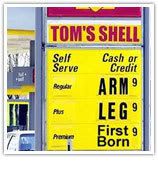
Do you ever wonder if your favorite gas station's pumps are accurate? Here is a simple and easy way to find out...and what to do about it if it's not accurate.
After all, we don't need to be giving away an arm, a leg and our firstborn...just yet.
The results of this test will not be affected by the grade of gasoline you use, or the time of day you are pumping it.
1. Put exactly ten gallons in your tank. (This test will not be accurate if you put a smidgen less than ten gallons, nor will it work if you accidentally go over ten gallons, even by just a little bit.)
2. Now, look at the price at the pump. The price you pay should be exactly ten times the per gallon price of the gas. If it is not, then the pump is not accurate.
If the pump is not accurate, this does not mean it is rigged
More often than not, the problem is with worn check valves. This means that the favor could swing either way, to you or the gas station.
The check valve is the gizmo that is supposed to make the price meter start ticking at the exact same time as the gas starts flowing. A common symptom of wearing out is when the price meter advances a few cents before the gas starts flowing.
The likelihood of the meter or the pump being deliberately rigged are very slim. The meter itself is built in such a way that it is not 'riggable'. State inspections that go along with state and federal laws are another strong deterrent to any temptations a dishonest gas vendor may have.
If you encounter a problem, report it to the gas station manager and/or to the local Commissioner of Weights and Measures.
This copyrighted article may be reprinted by you for noncommercial use, if the following credit is given:
This article is an excerpt from Mrs. Tightwad's Handbook #1: HOW TO SURVIVE DISASTERS AND OTHER HARD TIMES. For more information, see the left sidebar on this site: http://purecajunsunshine.blogspot.com/


No comments:
Post a Comment